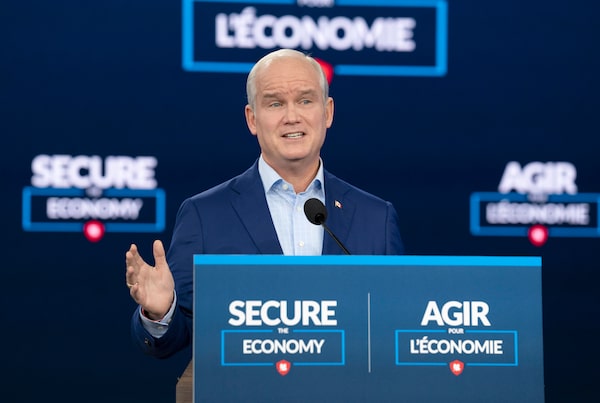
Conservative Leader Erin O'Toole has softened his rhetoric regarding "cancel culture," but has raised similar issues at times, such as opposing plans to replace former prime minister Wilfred Laurier on the five dollar bill.Frank Gunn/The Canadian Press
Conservative Leader Erin O’Toole says he respects Ryerson University’s decision to change its name, after he previously criticized the debate and referred to similar efforts as cancel culture.
The Toronto university announced last week it would be renamed because of the legacy of its namesake, Egerton Ryerson, who contributed to the creation of Canada’s residential school system. At a campaign event in Ottawa on Tuesday, Mr. O’Toole was asked about his response to the news.
“I’ll always respect institutions, governments, making decisions about their own institution and their approach to reconciliation,” he answered. “I’ve said these conversations have to learn from our history, not try and erase it, but they have to be responsible conversations, and even I have to hold myself to making sure that’s the case.”
During his 2020 campaign for the Conservative leadership, Mr. O’Toole frequently raised concerns about “cancel culture.” Now campaigning as party leader, he has softened his rhetoric, but has raised similar issues at times, such as opposing plans to replace former prime minister Wilfrid Laurier on the five dollar bill.
Late last year, Mr. O’Toole made – and then took back – a comment about residential schools to a Conservative club at Ryerson University, where he said the institutions were intended to “try and provide education.” He also mocked the “woke crowd” pushing for the renaming of the university.
He’s also criticized Mr. Trudeau’s decision to rename Langevin Block in Ottawa in 2017, which the government said was a gesture of reconciliation. The building was named after Hector-Louis Langevin, a member of Sir John A. Macdonald’s government who helped create the residential school system.
“If we start this trend, of eliminating the history to meet [Trudeau’s] political narrative, where is it going to end?” he said in a video last year, in which he also talked about how “cancel culture, the radical left” is trying to cancel the Canadian flag.
Mr. O’Toole was also asked on Tuesday if he would reverse the decision to remove the name Langevin from the building, which is now called the Office of the Prime Minister and Privy Council. Mr. O’Toole responded that “we have to learn from our history and try and make sure we commit today and in the future to the path of reconciliation.” He later added that he wanted to “have responsible discussions about our past.”
Mr. O’Toole also drew criticism last week for saying that flags on federal buildings should be raised, after being at half-mast in response to the uncovering of hundreds of unmarked graves at the sites of former residential schools which began this spring.
When asked Tuesday about Mr. O’Toole’s comments last week about the need to raise the Canadian flag, Assembly of First Nations National Chief RoseAnne Archibald said that the longer they remain at half mast, the more children are honoured, along with families and communities.
In its platform, the Conservative Party promises to make amends for past injustices at residential schools, which includes developing a plan to address Truth and Reconciliation Commission recommendations, as well as creating resources to educate Canadians on the history of residential schools. It also pledges to build a national monument in Ottawa to honour “residential school survivors and all the children who were lost.”
The Conservative platform also outlines other supports for Indigenous communities that include $1-billion over five years for mental health and drug treatment programs, and $4-million over three years to boost Indigenous businesses by hiring and training local economic development officers.
With a report from Kristy Kirkup in Ottawa.
Follow the party leaders and where they stand on the issues this election campaign by signing up for our Morning or Evening Update newsletters.
For subscribers only: Get exclusive political news and analysis by signing up for the Politics Briefing.